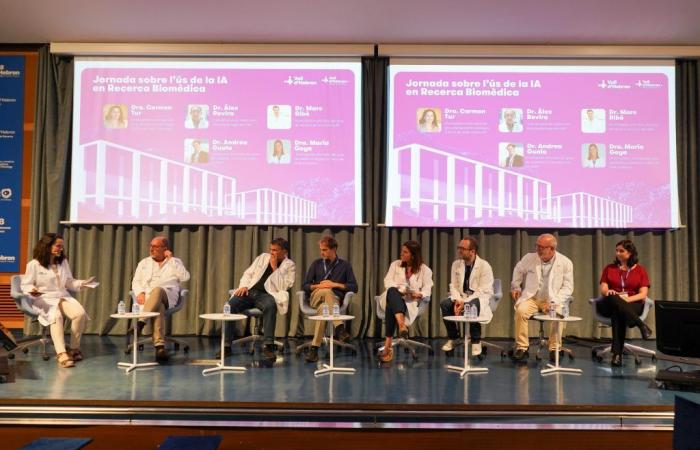Although in some aspects artificial intelligence (AI) still seems somewhat futuristic, its importance in the biomedical field is growing more and more and it has been evolving in the last 10 years to become essential for many researches. In fact, research using AI will grow exponentially in the coming years. This paradigm is the one presented by Carmen Tur, principal researcher of the Clinical Neuroimmunology group of the Vall d’Hebron Research Institute (VHIR) and CEMCAT, who has led a new edition of the Conference on the use of AI in Biomedical Research organized by Vall d’Hebron.
Leading AI research from VHIR
In fact, the VHIR already uses AI in different branches of research. In the Cardiovascular Diseases research group, for example, in the field of cardiac imaging, on the one hand, it is very useful for the automation of all tasks, so that they reduce time and gain reliability in the data. On the other hand, AI is used to discover things that people are not able to detect.
From the VHIR Clinical and Translational Bioinformatics research group, they found a large volume of biomedical information to integrate and extract predictions. Thanks precisely to AI, today they make blind predictions of variants associated with breast cancer and metachromatic leukodystrophy that are between first and second position.
The Molecular Medical Imaging research group uses AI not only to facilitate the segmentation of regions and not have to do it manually, but also to develop its own software. With the AI tools they develop, they can more easily access the diagnosis and prognosis of a specific type of pathology, and thus make personalized medicine more feasible with specific treatments or interventions for each patient.
Regarding multiple sclerosis, in the VHIR Clinical Neuroimmunology group, AI has helped them automate all the predictive models that they have been collecting for almost 30 years. Thus, new tools make it possible to automatically and accurately analyze the evolution of multiple sclerosis, which has a great impact on therapeutic management.
AI vs. Human biomedical expert
The role of AI, as we have said, is becoming more important and it is even said that AI surpasses the human expert. Xavier de la Cruz, head of the Clinical Bioinformatics group at VHIR, states that biomedical problems are difficult and the solutions are unstable and poor. They are true for both humans and machines, which have between 10% and 30% errors. AI is very powerful and does many things, but it is not capable of everything.
The human expert has a great opportunity to make an early diagnosis of minority diseases thanks to AI and thus avoid sequelae in the patient. But to do this, you need not only a good data system, but also good data quality and good data management. And this is where the human expert provides value, according to Pere Soler, head of the research group on Infection and Immunity in the Pediatric Patient.
One of the limits that most concerns when implementing the use of AI in biomedical research are the ethical aspects. The Legal Director of the VHIR, Anna Boix, has spoken to us precisely about some issues regarding the legal framework that must be taken into account during the investigation, such as the international and regional instruments where the principles are defined and how to apply them.
But which role is currently more important, artificial intelligence or the human expert in Biomedicine? The round table discussed the balance between one and the other as the basis of success for the future of biomedical research and points were raised for and against both. The conclusion is quite clear: in no case can AI replace the human expert, but rather it is the professional who must supervise the AI tools that are used as support. And in any case, the goal of using AI in biomedical research should be to improve patient care. Also participating in the discussion were Àlex Rovira, head of the Neuroradiology research group at VHIR; Marc Ribó, principal investigator of the VHIR Stroke research group; Albert Barberà, director of External Strategy at VHIR; María Goya, principal investigator of the Maternal and Fetal Medicine group at VHIR, and the public.






